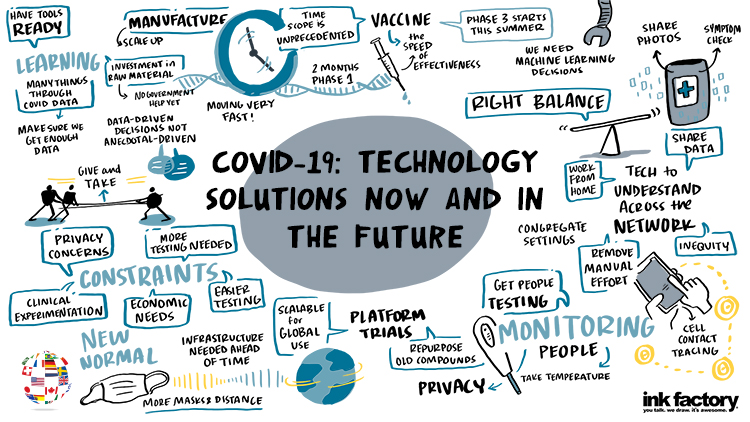WMIF MAIN SITE
2025 Event Site
At the 2020 World Medical Innovation Forum, experts leading large teams at the epicenter of the coronavirus outbreak discussed how technology is shaping the pandemic response today and in the coming years. In this panel, Stéfane Bancel of Moderna, Paul Biddinger, MD of Massachusetts General Hospital, David Kaufman of the Bill & Melinda Gates Medical Research Institute, and Rochelle Walensky, MD, of Massachusetts General Hospital shared emerging technologies and a glimpse of the “new normal.”
Technologies that share information have been highly utilized during the pandemic. Paul Biddinger, MD explains that technology assisting with sharing patient information within the network has been key: “The technologies that we have been developing that are indispensable are the ones that remove the manual effort from a lot of the query that count the patients and the details about their illness, so that we can quickly aggregate data, share data, and help people respond better by understanding the complexities of the disease.”
Additionally, cell phone use has been impactful through photo sharing and symptom tracking. Rochelle Walensky, MD stated: “One of the major technologies that is important for public health is that we can now attest by our cell phones that we are symptom-free. Everybody does that when they come to work to our medical institutions, but I am hopeful that we will be able to mobilize that as people start returning to work throughout the state.” There is a lot more that can be done with our phones, but this has been a great start.”
In terms of tracking patient data, we have been able to do remarkable things with our cell phones. Patients can be given a thermometer to self-monitor, and by logging this into their cell phones, their data is going to a central database, where the average population temperature can be tracked. This type of tracking can help predict when an outbreak may occur. Contact tracing would also be impactful: “I do think our cell phones could be invaluable tools in terms of contact tracing. Our cell phones know where we have been, who we have been in contact with, and how long we were in contact with them,” Dr. Walensky explained.
David Kaufman explained that the systems level biology tools are making a huge difference with response: “We have Single-cell RNA data from infected individuals in different age groups, we have mapping of a viral interactome, and these have happened in multidisciplinary settings that have brought together scientists from around the world. We are learning about the biology of COVID-19, and we are learning about the components of the disease that impact inflammation and immunity.”
As we adapt to all the changes and impacts of the pandemic, we are slowly accepting new routines. Each panelist predicted what changes they think will be our new normal:
“All of our tomorrows until we have a vaccine will be in masks. I think that we will be further apart, doing more telehealth, more working from home, and leveraging the technology to figure out how we can do more monitoring and tracking. I do think everyone will need to test that they are asymptomatic before showing up to a venue.”- Rochelle Walensky, MD
“I think we’re going to be having to figure out solutions to some of the challenges that are unavoidable. New rules will have to be figured out when we can’t avoid having people together in congregate settings, but we will have to do it safely.”- Paul Biddinger, MD
“The epidemic is highlighting issues of inequality and inequity. We’re seeing the highest sites of transmission of the disease are in poor communities, and we are going to have huge issues around equity and global access once we have an effective vaccine. How we respond to these issues will be important.”- David Kaufman
“I think the biggest impact will be on how we live together and how we work. We are planning to keep everyone who can work at home to stay working at home to reduced density. We are realizing that we can do much more on Zoom that we thought we could. I think a big change will be in the workplace and how we work together.”- Stéfane Bancel